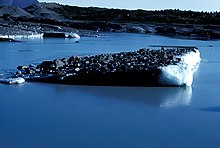
Ice rafting is the transport of various materials by ice. Various objects deposited on ice may eventually become embedded in the ice. When the ice melts after a certain amount of drifting, these objects are deposited onto the bottom of the water body, e.g., onto a river bed or an ocean floor. These deposits are called ice rafted debris (IRD) or ice rafted deposits. Ice rafting was a primary mechanism of sediment transport during glacial episodes of the Pleistocene when sea levels were very low and much of the land was covered by large masses (sheets) of ice. The rafting of various size sediments into deeper ocean waters by icebergs became a rather important process. Ice rafting is still a process occurring today, although its impact is significantly less and much harder to gauge.
The melting of large icebergs deposits sediment of various sizes, usually referred to as glacial marine sediment, onto the shelf and deeper marine areas.
Ice rafting may be used for analysis of ice drift pattern by matching the rafted sediment with its origin.
Ice rafting must also be taken into an account in archaeology and as a possible cause of displacement of archaeological artifacts.
See also
- Bond event
- Glacial debris
- Drift station, a facility built on an ice floe
- Dropstone
- Swallow float
- Glacial erratic
References
- ^ Bischof, Jens (January 2002). "Ice In The Greenhouse: Earth May Be Cooling, Not Warming" (PDF). Quest. Vol. 5, no. 1. Old Dominion University. pp. 8–11. Archived from the original (PDF) on 5 July 2016.
- ^ Bischof, Jens (2000). "The concept of ice rafting". Ice Drift, Ocean Circulation and Climate Change. Springer-Praxis Books. Springer-Verlag. pp. 9–10. ISBN 978-1852336486.
Further reading
- Boggs, Sam Jr. (2006). Principles of Sedimentology and Stratigraphy (Fourth ed.). Upper Saddle River, New Jersey: Pearson Prentice Hall. ISBN 978-0131547285.
- Alexei Rudoy. Rafting (Glaciology). Рафтинг (гляциология)
| Ice | |||||
|---|---|---|---|---|---|
| The solid state of water | |||||
| Major phases | |||||
| Formations | |||||
| Phenomena | |||||
| Ice-related activities |
| ||||
| Constructions | |||||
| Work | |||||
| Other uses | |||||
| Ice ages | |||||